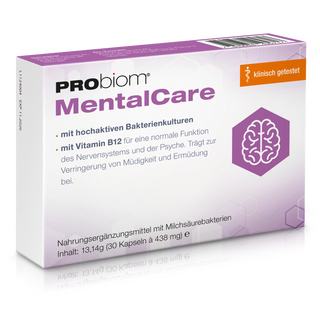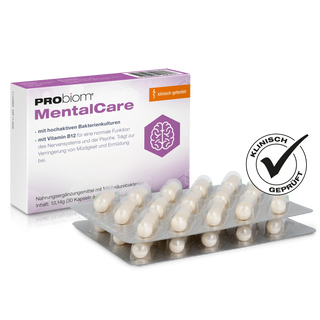The gut is much more than just a digestive organ. It is the center of our health, our "second brain," and a complex ecosystem that plays a pivotal role in our immune system, our mental balance, and our overall vitality. Probiotics—live microorganisms with health-promoting effects—have received increasing attention in recent years because of their ability to directly influence the delicate balance of our intestinal flora.
In this comprehensive blog post, you'll learn how probiotics work in the gut, why they're so important for our health, what types there are, and how you can integrate them into your daily routine. Whether you suffer from digestive problems, allergies, skin problems, or mood swings, your gut could hold the key to the solution.
The intestine: The center of health
The human digestive tract is home to approximately 100 trillion microorganisms that play an important role in our health. This community of bacteria, viruses, fungi, and other microbes is known as the microbiota, or intestinal flora. When it's in balance, we feel healthy, our immune system functions properly, and our mental health also benefits. However, if it gets out of balance, it can have far-reaching consequences – from bloating and diarrhea to chronic illnesses such as irritable bowel syndrome, depression, or skin diseases.
This is exactly where probiotics come in: They support the healthy bacteria in the intestine, displace pathogenic germs and help to regenerate the microbiome.
What are probiotics?
Probiotics are live microorganisms that, when administered in sufficient quantities, have a health-promoting effect on the host – this is the official definition of the World Health Organization (WHO). The best-known examples are lactic acid bacteria such as Lactobacillus and Bifidobacterium , but yeasts such as Saccharomyces boulardii also belong to this group.
These bacteria are not foreign bodies, but natural inhabitants of a healthy gut. They produce lactic acid, inhibit the proliferation of pathogens, support nutrient absorption, and regulate the immune system. A balanced microbiome with a high proportion of probiotic bacteria is therefore considered an important factor for a long and healthy life.
Causes of an imbalance in the intestinal flora
There are many reasons why the intestinal flora can become unbalanced. These include:
-
Antibiotic intake
-
Constant stress
-
Malnutrition (e.g. too much sugar, fat, alcohol)
-
Lack of exercise
-
Environmental toxins and additives in food
-
Caesarean section and lack of breastfeeding in early development
A disrupted microbiome not only manifests itself in digestive problems, but can also be associated with skin conditions such as acne or atopic dermatitis, autoimmune diseases, susceptibility to infections, depression, or obesity.
Effect of probiotics on the intestine
Probiotics exert their effects on various levels. They help restore the intestinal flora after antibiotic therapy, regulate digestion, reduce diarrhea and bloating, support the barrier function of the intestinal mucosa, and can even reduce chronic inflammation.
Probiotics also influence the production of important vitamins such as B12, K2, and biotin, promote the absorption of minerals, and communicate with the immune system through complex mechanisms. Thus, they contribute to the prevention and treatment of a wide variety of diseases.
Probiotics are particularly valuable in cases of irritable bowel syndrome, chronic inflammatory bowel diseases such as Crohn's disease and ulcerative colitis, Candida infections or after antibiotic therapy.
Probiotics and the immune system
Approximately 70% of our immune cells are located in the gut. The microbiome constantly communicates with the immune system and determines whether or not to initiate a response. Probiotics help improve this communication. They can calm overreactive immune responses, such as those found in allergies or autoimmune diseases, while simultaneously strengthening the defense against pathogens.
Furthermore, certain strains can even improve the effectiveness of vaccinations or reduce the incidence of colds. So-called "mucosal immunity," or the defense system of the mucous membranes, is also strengthened by probiotic bacteria.
Influence of probiotics on the psyche
The gut and brain are closely connected via the so-called gut-brain axis. New studies show that certain probiotics can improve mood, reduce anxiety, and alleviate depressive moods. These "psychobiotics" influence, among other things, the production of neurotransmitters such as serotonin and GABA, which control our emotional balance.
Therefore, probiotics are not only important for digestion, but also for our mental health. A healthy gut can help us better manage stress and remain more emotionally stable.
Natural sources of probiotics
Probiotics are available not only in capsule or powder form, but also in numerous fermented foods. Natural sources include:
-
Yogurt with live cultures
-
kefir
-
Sauerkraut (raw, unpasteurized)
-
Kimchi
-
Miso
-
Tempeh
-
Kombucha
These foods not only provide probiotic bacteria, but also enzymes, vitamins and phytochemicals that promote intestinal health.
Selection of probiotic preparations
Not all probiotics are the same. When choosing a supplement, consider the following criteria:
-
Contains several well-documented bacterial strains (e.g. Lactobacillus rhamnosus , Bifidobacterium lactis )
-
Sufficiently high bacterial count (at least 1 billion CFU per portion)
-
Gastric acid resistance (bacteria must survive the stomach)
-
Free from additives, gluten, lactose or preservatives
-
Ideal: Combination with prebiotics (fiber as food for bacteria)
It is advisable to take it as a course of treatment for at least four to eight weeks, ideally accompanied by a high-fiber, gut-friendly diet.
When are probiotics particularly useful?
Probiotics can be helpful in many life situations:
-
After antibiotic treatment
-
For irritable bowel syndrome or digestive problems
-
To strengthen the immune system
-
For food intolerances
-
For skin problems such as eczema or acne
-
In times of increased psychological stress
-
For allergies and autoimmune diseases
-
As support for those wanting to have children and for pregnancy
Children can also benefit from probiotic support, for example to prevent neurodermatitis or to strengthen their immune system.
Conclusion: Probiotics as natural support for a healthy gut
A healthy gut is the foundation for well-being, performance, and inner balance. Probiotics can make a valuable contribution to regenerating the microbiome, improving digestion, and stabilizing the immune system . They not only work locally in the gut, but also have a positive impact on the entire organism.
Whether as a dietary supplement or in the form of fermented foods, those who regularly supply their gut with live, beneficial bacteria are making a long-term investment in their health. While science is still in its infancy, the findings so far already clearly demonstrate the enormous potential of these little helpers.


















